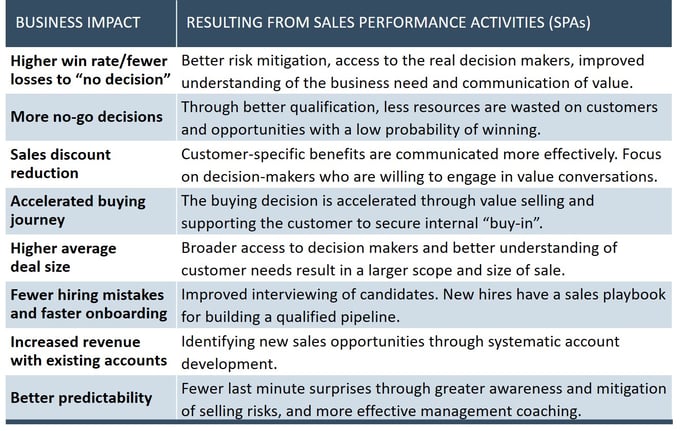A recent article about 21 popular sales methodologies got me thinking about my own criteria for what makes a sales methodology good. I developed this check-list to help you assess your company’s sales methodology and to identify areas for improvement.
Definition
A sales methodology describes how your sales team approaches each phase of the sales process? Take Qualification, for example. A good sales methodology ensures that you pursue the right opportunities, identify and mitigate selling risks and avoid wasting resources on dead horses. If qualification is a strength of your sales organisation, then you most probably have a good methodology for this phase of the sales process.
Criteria to assess your sales methodology
- Adoption
The best sales methodology is the one that is used. What percentage of your sales team consistently applies your sales methodology in daily business? Anything below 75% indicates that something is wrong i.e. they don’t see its value or even worse, perceive it as administration. Possible reasons for poor adoption: It doesn’t drive individual performance, is overcomplicated or is used more as a means of control than to help individuals and teams succeed. Embedding your sales methodology into CRM can increase adoption – or reduce it if you overengineer the solution.
- Customer-centricity
I believe that a good sales methodology should reflect how customers define good selling. Many sales methodologies fall short on this important design principle. A Meeting Planner, for example, should be based on how customers define good meetings. Moreover, it should reflect the different meeting objectives and questions to ask depending on where the customer is in their Buying Journey.
- Flexibility
Every sales opportunity is different and requires different elements of your sales methodology. One shoe size doesn’t fit all. For example, winning a new corporate client most probably requires a business case whilst an upsell to an existing customer might not. Different opportunity types (RFPs, SME, Public Sector) might even require a different sales process. An almost guaranteed motivation-killer is to treat all opportunities the same. I recommend assembling a sales methodology toolkit to fit your business but then to leave it up to the sales person to decide which elements are relevant for each opportunity.
- Learning Content
A modern sales methodology should support self-service and micro-learning and provide train-the-trainer handbooks to quickly transfer responsibility for delivery to internal sales leaders. Having to depend on external trainers is an expensive and sub-optimal solution for scaling a sales methodology across an organisation.
Moreover, each concept should focus on the how, not just the what e.g. which questions can you ask a customer to thoroughly qualify an opportunity, which questions can a sales leader ask to challenge a team members’ perception.
- Game Changers
Really significant improvements in your chances of winning require Game Changers. Only doing what the customer asks you to do is the best way to land in position #2 or #3. What do I mean by a Game Changer? Firstly, it is something you do in a sales opportunity that radically disrupts the way the customer views you, your solution or the competition. The emphasis is on the word “radically”. Secondly it has to be something that can be easily replicated and used again and by other sales team members.
Game Changers are likely to come from your best sales people - the ones who are good at expressing what they do intuitively in a way that can be effectively communicated throughout the sales team and be used by all of them. A good sales methodology must include and continuously be updated with real Game Changers.
- Results-orientated
How well does your sales methodology drive sales activities that have a real effect on business results?

Modernise vs. replace
I envisage that your current sales methodology fairs well against some of the above criteria and less well against others. Another important design principle of a good sales methodology is that it should evolve over time taking onboard concepts that you currently don’t have, but need in the future.
